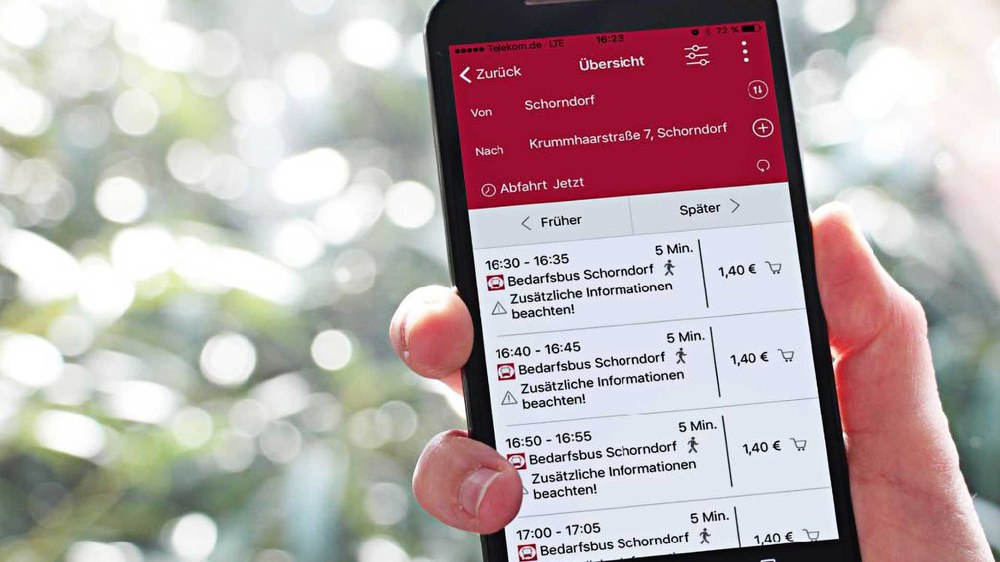From March to December 2018, the on-demand bus replaced two regular bus routes. In addition to the previous stops, there were more than 200 potential boarding and alighting points. For users, this meant shorter walking distances, new direct connections and more flexibility - especially in times of low capacity utilisation.
After around three years, the Schorndorf real-world laboratory came to an end with a public closing event on 25 January 2019. The DLR transport scientists' partners included the city of Schorndorf, the Stuttgart Transport and Tariff Association (VVS), Knauss Linienbusse, Esslingen University of Applied Sciences and the Centre for Interdisciplinary Risk and Innovation Research (ZIRIUS) at the University of Stuttgart.
In the Reallabor Schorndorf research project, science, local authorities and companies have worked hand in hand with citizens to develop a pioneering solution for local public transport. The flexible on-demand bus intelligently combines mobility and digitalisation. Such successful examples clearly show that Baden-Württemberg has taken the right path with the real-world laboratory model: Here, science, business and society are working together on key social issues and testing pioneering solutions in reality.
In Baden-Württemberg, a total of 14 real-world laboratory projects have been funded with around 18 million euros since 2015. With its world-class scientific institutions and companies, Baden-Württemberg will have a decisive and lasting impact on the future of mobility, the Minister said with conviction.
Attractive public transport is very important for the town of Schorndorf. By realising the real-world laboratory project in our town, we have shown that we are open to innovative and forward-looking projects and are actively involved in shaping them - together with our citizens. I am delighted that we have been able to show with the real-world laboratory project that linking digital systems with flexible local public transport works. For me, this is an important step towards the mobility of the future.
Project goals
- Design, implementation, operation and evaluation of a demand-orientated, innovative operating concept for public transport with buses: without stops, without timetables, without fixed routes. This includes smartphone apps for ordering the bus and providing information for the bus drivers (navigation and information on boarding and alighting) and a scheduling system for creating optimised bus routes. The software combines the passengers' incoming journey requests into a customised route for each round.
- Development of vehicle concepts that take into account the requirements of needs-based operation
Investigation of questions such as:
- What are the requirements for future service concepts in public transport?
- How can users be developed into co-designers in the development process and continuously involved?
- What could an innovative vehicle for use in this operating concept look like?
Results
- The figures: 10,000 passengers, halved fuel consumption, no empty journeys
- During the project, the researchers collected a large amount of data and experience. Analysing this data provides new scientific insights into how forward-looking mobility concepts for local public transport can be designed and implemented.
- In total, the two minibuses used in the project transported more than 10,000 passengers and covered over 20,000 kilometres. On average, around 250 people used the service every weekend. Two thirds of them ordered the bus using the smartphone app, while one third used the telephone ordering service. All other options - ordering via the website or in participating shops, restaurants and cafés - were rarely utilised.
"The practical operation of the on-demand bus demonstrated the opportunities and challenges of such a system very well," summarises the project manager of the Schorndorf real-world laboratory and DLR researcher Mascha Brost. Compared to the scheduled system, around ten percent of the vehicle kilometres and a good 20 percent of the possible rotations could be saved completely because there were no bookings. As smaller buses were used, fuel consumption was reduced by more than half. The avoidance of empty journeys in particular was rated very positively by many Schorndorf residents in surveys.
Funded by the Baden-Württemberg Ministry of Science, Research and the Arts

Project partners
• DLR-Institut für Fahrzeugkonzepte
• DLR-Institut für Verkehrsforschung
• DLR-Institut für Verkehrssystemtechnik
• Stadt Schorndorf
• Verkehrs- und Tarifverbund Stuttgart (VVS)
• Knauss Linienbusse
• Hochschule Esslingen
• Zentrum für interdisziplinäre Risiko- und Innovationsforschung (ZIRIUS) der Universität St

